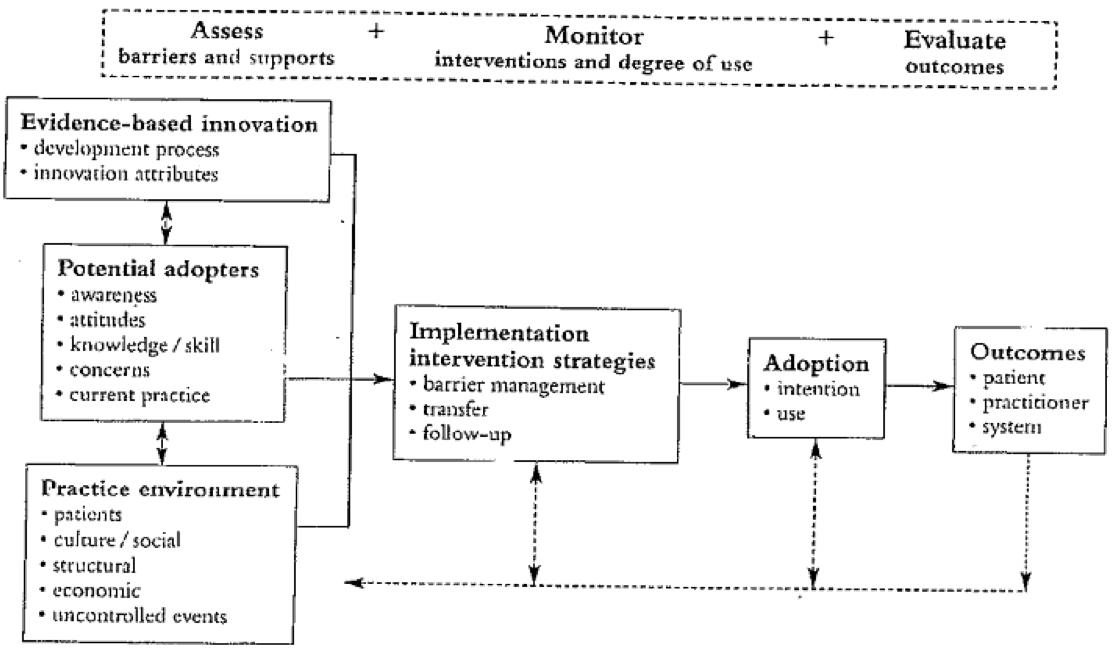Active Implementation Framework
D and/or I:
 The focus on dissemination and/or implementation activities. D-only focuses on an active approach of spreading evidence-based interventions to target audience via determined channels using planned strategies. D=I, D>I, and I>D means there is some focus on both dissemination and implementation. I-only focuses on process of putting to use or integrating evidence-based interventions within a setting.
The focus on dissemination and/or implementation activities. D-only focuses on an active approach of spreading evidence-based interventions to target audience via determined channels using planned strategies. D=I, D>I, and I>D means there is some focus on both dissemination and implementation. I-only focuses on process of putting to use or integrating evidence-based interventions within a setting.
I-Only Socio-Ecological Levels:
 The level of the framework at which the model operates. Individual includes personal characteristics; Organization includes hospitals, service organizations, and factories; Community includes local government and neighborhoods; System includes hospital systems and government; Policy includes changes in policy.
The level of the framework at which the model operates. Individual includes personal characteristics; Organization includes hospitals, service organizations, and factories; Community includes local government and neighborhoods; System includes hospital systems and government; Policy includes changes in policy.
- Individual
- Organization
- Community
Number of Times Cited:
 The # of times the original publication for the model was cited as indicated by Google Scholar since 2016.
The # of times the original publication for the model was cited as indicated by Google Scholar since 2016.
1870 Field of Origin:
 The field of study in which the model originated.
The field of study in which the model originated.
Education Practitioner/Researcher:
 Whether the model is for the use of practitioners and/or researchers.
Whether the model is for the use of practitioners and/or researchers.
Researcher and Practitioner Rating:
 These are ratings given by users of the site.
These are ratings given by users of the site.
Constructs:
 Name of the construct developed by classifying/aligning the elements abstracted from models.
Name of the construct developed by classifying/aligning the elements abstracted from models.
Assessment Instruments:
 Name of the assessment developed by classifying/aligning the elements abstracted from models.
Name of the assessment developed by classifying/aligning the elements abstracted from models.
- Acceptability, Practicability, Effectiveness, Affordability, Side-Effects, and Equity (APPEASE)
- Clinical Sustainability Assessment Tool (CSAT)
- Consolidated Framework for Implementation Research (CFIR) Interview Guide (Lam)
- Consolidated Framework for Implementation Research (CFIR) Interview Guide (Zhao)
- Consolidated Framework for Implementation Research (CFIR) Interview Guide Webtool
- Contextual Determinants Affecting Implementation – Qualitative Interview Guide
- Diagnosis Related Group (DRG) Policy Survey
- Dissemination and Implementation Research Capability Self-Survey (DIRC-SS)
- Evidence Based Practice Attitude Scale (EBPAS)
- Framework for Reporting Adaptations and Modifications to Evidence-based Implementation Strategies (FRAME-IS) Adaptation Tracking Instrument
- Glisson's Organizational Social Context (OSC)
- Goodman's Level of Institutionalization
- Hall's Levels of Use Scale
- Implementation Climate Scale (ICS)
- Implementation Leadership Scale (ILS)
- Implementation Strategy Usability Scale
- Intervention Determinants Item Banks (IDIB)
- Intervention Scalability Assessment Tool (ISAT)
- Inventory of Factors Affecting Successful Implementation and Sustainment (IFASIS)
- Iterative, Practical, Robust Implementation and Sustainability Model (iPRISM) Webtool
- Knowledge Exchange Outcomes Tool
- Landry's Knowledge Utilization Scale among Policymakers
- Local Wellness Policy Implementation Checklist
- Local Wellness Policy Survey
- Normalization Process Theory Interview Guide
- Normalization Process Theory Questionnaire (NoMAD)
- Organizational Readiness for Implementing Change (ORIC)
- Partnership/Synergy Assessment Tool
- Policy Coalition Evaluation Tool (PCET)
- Practical, Robust Implementation and Sustainability Model (PRISM) Contextual Survey Instrument (PCSI)
- Practical, Robust Implementation and Sustainability Model (PRISM) Interview Guide
- Pragmatic Context Assessment Tool (pCAT)
- Program Sustainability Assessment Tool (PSAT)
- Program Sustainability Index
- Rapid Assessment Procedure Informed Clinical Ethnography (RAPICE) Protocol, Activity, and Interview Prompt Guide
- Rapid Assessment Procedure Informed Clinical Ethnography (RAPICE) Summary Template
- Readiness Thinking Tool - Observation Guide
- Readiness Thinking Tool - Survey
- Readiness for Recovery and Resiliency - Interview Guide
- Rehabilitation Policy Questionnaire
- Research Engagement Survey Tool (REST)
- Research Engagement Survey Tool (REST) - 9 item
- Short Program Sustainability Assessment Tool (PSAT)
- Stages of Implementation Completion (SIC)
- Strategies for Translation and Research Log (STAR Log)
- Sustainability Measure for Healthcare
- Sustainment Leadership Scale (SLS)
- The Implementation Quality Appraisal Checklist (IQAC)
- Van Schaik's Technology Acceptance Model (TAM)
- integrated-Promoting Action on Research Implementation in Health Services (i-PARIHS) Interview Guide
Website:
 Website.
Website.
https://nirn.fpg.unc.edu/ai-hub
Citations:
 The original publication(s) of the model.
The original publication(s) of the model.
Fixsen DL, Naoom SF, Blase KA, Friedman RM, Wallace F. Implementation research: a synthesis of the literature. Tampa FL: University of South Florida, Louis de la Parte Florida Mental Health Institute, The National Implementation Research Network, 2005. FMHI Publ. #231.
Institute FCD. National Implementation Research Network. 2008. Examples:
 Citations of studies that have used the model as an outline for their study.
Citations of studies that have used the model as an outline for their study.
Casado BL, Quijano LM, Stanley MA, Cully JA, Steinberg EH, Wilson NL. Healthy IDEAS: implementation of a depression program through community-based case management. Gerontologist 2008;48(6):828. doi: 10.1093/geront/48.6.828Graff CA, Springer P, Bitar GW, Gee R, Arredondo R. A purveyor team’s experience: lessons learned from implementing a behavioral health care program in primary care settings. Families, Syst, Health 2010;28(4):356. doi: 10.1037/a0021839
McKay VR, Margaret Dolcini M, Hoffer LD. The dynamics of de-adoption: a case study of policy change, de-adoption, and replacement of an evidence-based HIV intervention. Transl Behav Med. 2017 Dec;7(4):821-831. doi: 10.1007/s13142-017-0493-1.
Skogøy BE, Sørgaard K, Maybery D, Ruud T, Stavnes K, Kufås E, Peck GC, Thorsen E, Lindstrøm JC, Ogden T. Hospitals implementing changes in law to protect children of ill parents: a cross-sectional study. BMC Health Serv Res. 2018 Aug 6;18(1):609. doi: 10.1186/s12913-018-3393-2.
There are no reviews yet. Be the first one to write one.
